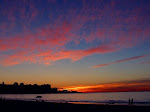Sunday, January 27, 2008
Holy Sonnet 10
The Fly
Am not I
For I dance
If thought is life
Then am I
Friday, January 25, 2008
The Lamb
"The Lamb" by William Blake
Little Lamb, who made thee?
Dost thou know who made thee?
Gave thee life, and bid thee feed,
By the stream and o'er the mead;
Gave thee clothing of delight,
Softest clothing, woolly, bright;
Gave thee such a tender voice,
Making all the vales rejoice?
Little Lamb, who made thee?
Dost thou know who made thee?
Little Lamb, I'll tell thee,
Little Lamb, I'll tell thee.
He is called by thy name,
For He calls Himself a Lamb.
He is meek, and He is mild;
He became a little child.
I a child, and thou a lamb,
We are called by His name.
Little Lamb, God bless thee!
Little Lamb, God bless thee!
"The Lamb" is a poem of innocence and kindness. The animal is used to describe something that is very innocent and righteous. In the poem it says he becomes a child making reference to Jesus Christ who, according to the Christian belief, came to earth as a man and lamb. In the poem, the Lamb is represented as Jesus Christ and God also a reference to the Christian belief. This poem has a very straight forward tone that is very confident and formal.
When I Have Fears That Cease To Be
Poetry of John Keats (1795-1821)
"When I have Fears that I may Cease to Be"
When I have fears that I may cease to be
Before my pen has glean'd my teeming brain,
Before high-piled books, in charactery,
Hold like rich garners the full ripen'd grain;
When I behold, upon the night's starr'd face,
Huge cloudy symbols of a high romance,
And think that I may never live to trace
Their shadows, with the magic hand of chance;
And when I feel, fair creature of an hour,
That I shall never look upon thee more,
Never have relish in the fairy power
Of unreflecting love;--then on the shore
Of the wide world I stand alone, and think
Till love and fame to nothingness do sink.
John Keats writes about his fears of dying before hes able to write everything on his mind. He is afraid he will die before has written full and beautiful poetry in piles and piles of his own books. It seems he is afraid of dying only because he will never be able to write again and also he will lose love and fame resulting in loneliness. I think John Keats writes about the subject because he was going through a rough time in his life and he was getting very sick. The tone of this poem is very dark and lonesome proving that the author himself was going through a rough time in his life.
Thursday, January 17, 2008
Sonnet 292
"Sonnet 292" by Francesco Petrarch (1304-1374)
The eyes I spoke of once in words that burn,
the arms and hands and feet and lovely face
that took me from myself for such a space
of time and marked me out from other men;
the waving hair of unmixed gold that shone,
the smile that flashed with the angelic rays
that used to make this earth a paradise,
are now a little dust, all feeling gone;
and yet I live, grief and disdain to me,
left where the light I cherished never shows,
in fragile bark on the tempestuous sea.
Here let my loving song come to a close;
the vein of my accustomed art is dry,
and this, my lyre, turned at last to tears.
Sonnet 292 explains the loss of love in a loving way and then half way through the poem, the author spills his mourns. The tone is definitely dramatic through the way he explains this great love for someone and then completely destroys it. His word choice is simple but powerful at the same time. I like this poem because of its dramatic format and its simplicity.
Wednesday, January 16, 2008
Advice.
The trick is, to live your days,
as if each one may be your last
(for they go fast, and young men lose their lives
in strange and unimaginable ways)
but at the same time, plan long range
(for they go slow: if you survive
the shattered windshield and the bursting shell
you will arrive
at our approximation here below
of heaven or hell).
To be specific, between the peony and the rose
plant squash and spinach, turnips and tomatoes;
beauty is nectar
and nectar, in a desert, saves -
but the stomach craves stronger sustenance
than the honied vine.
Therefore, marry a pretty girl
after seeing her mother;
show your soul to one man,
work with another,
and always serve bread with your wine.
But, son,
always serve wine.
"Advice to my Son" is the best poem out of the gallery walk because of its great and honest advice. His word choice is simple but yet complex in a way. His subject on life towards his son is somewhat vague but very solid and to the point which gives it a good tone. The tone is very serious and inspiring and is definitely something that would be remembered. I like that the advice is less strict than advice that you would see an everyday dad give. He gives his son the perfect advice by showing him freedom pays through not worrying about the future and then balancing it out with honest deeds. J. Peter Meinke sums up the meaning of his poem with "always serve bread with your wine. But, son, always serve wine." meaning , always keep an honest soul (bread) in mind when having fun (wine), but always have fun (wine).

